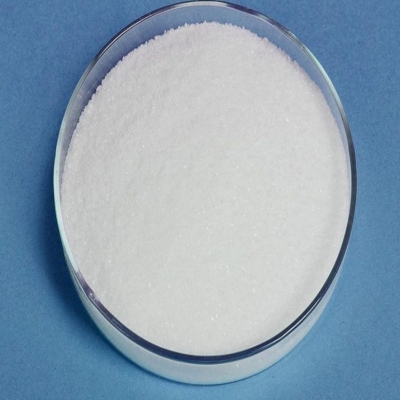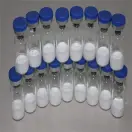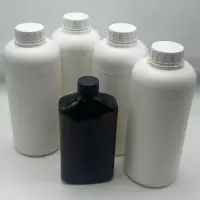Looking at the status of anti-tumor drug declarations in 2017, 2 monoclonal antibodies and 3 tinibs are worth looking forward to!
-
Last Update: 2018-01-18
-
Source: Internet
-
Author: User
Search more information of high quality chemicals, good prices and reliable suppliers, visit
www.echemi.com
Antitumor drugs have always been a hot area for innovative companies to explore, and also the main force for national priority review and approval policies According to the drug intelligence registration and acceptance database, of the 4810 records accepted by CDE in 2017, 163 were included in the priority review, 30 of which were anti-tumor drugs, and its development naturally attracted the attention of people in the industry So in 2017, how about the declaration of domestic antineoplastic drugs? How many have been approved clinically, and which new drugs are coming to market to benefit patients? Let's have a look Declaration of antitumor drugs in recent 10 years in China Before analyzing the declaration of antitumor drugs in 2017, let's briefly review the declaration of antitumor drugs in the past 10 years (Figure 1) Figure 1 shows the overall declaration trend of anti-tumor drugs in recent ten years In 2015, it reached the declaration peak, which was 786 (calculated by acceptance number, the same below) In 2016, it dropped significantly, which is consistent with the overall trend of drug declaration, and affected by policies such as clinical self-examination and verification, imitation consistency evaluation, etc Chemical medicine and general application curve are basically consistent, while biological medicine and traditional Chinese medicine have different trends The trend of application for biological medicine is getting better In 2017, the number of applications reached the highest of 86, while that of traditional Chinese medicine is not very ideal In 2009, the number of applications reached the highest of 34, and then it basically decreased year by year, reaching the lowest of only 3 by 2016 Application of antineoplastic drugs in 2017: in 2017, CDE accepted 414 antineoplastic drugs (calculated by acceptance number, the same below), including 86 biological products, 322 chemical drugs and 6 traditional Chinese medicines 1 Among the biopharmaceutical products, 4 are reported for production, and the task types are all listing applications At present, they are in the state of review and approval; 62 are reported for clinical application, 35 are completed - approved documents have been issued; 25 are under review and approval, 2 are completed - to be prepared Three monoclonal antibodies will be put on the market, including the new drug rituximab injection, imported drug nivolumab injection and cetuximab injection (as shown in Figure 2) Among them, the imported drug nivolumab injection is the priority for evaluation Figure 2 Nivolumab is the world's first listed monoclonal antibody against PD-1, which was first approved in Japan Since the first indication of melanoma was obtained in the United States on December 22, 2014, it has been successively approved by the FDA for 9 major indications In China, nivolumab injection is expected to be launched in the first half of 2018, becoming the first PD-1 / PD-L1 drug in China In addition, rituximab injection produced by Shanghai Fuhong Hanlin, a new drug to be launched, is mainly suitable for the treatment of non Hodgkin lymphoma and rheumatoid arthritis At present, only this enterprise in China has obtained the production approval According to the database of pharmaceutical intelligence, rituximab injection imported by Roche has won the bid in 29 regions, and the bid price of 10ml: 0.1g * 1 specification in 2017 was 3065.83 yuan Two class 1 monoclonal antibodies have been approved, 35 of which have been reported to the clinic and the certificate has been made Among the approved products, 12 new drugs and 13 imported ones are included It is worth mentioning that there are 4 new drugs of class 1, including two products of recombinant all human anti RANKL monoclonal antibody injection declared by Lizhu and recombinant human anti PD-1 monoclonal antibody injection declared by Hanzhong biology and baiaotai biology of Taizhou (as shown in Figure 3) Fig 3 in addition, there is also a new class 1 drug in 25 products that are being reviewed and approved by the clinical department - recombinant anti VEGF humanized monoclonal antibody injection declared by biotherapex (see Fig 4) Figure 4 2 62 chemical and chemical drugs are reported to be produced in China, one of which has been certified - approved, 61 of which are under review and approval; 55 of which are reported to be clinical, 31 of which have been certified - approved, 24 of which are under review and approval The production of epirubicin hydrochloride injection has been reported to be completed During the production, only the epirubicin hydrochloride injection declared by Sanlian Pharmaceutical Co., Ltd has been completed (as shown in Figure 5) According to the domestic database of pharmaceutical intelligence, Zhejiang Haizheng and Pfizer have obtained the production approval of the product In addition, it has bid winning information in 29 regions The bid price of 5ml: 10mg * 1 specification in 2017 is 94.25 yuan Figure 5 Three TiNi reports are in the process of review and approval, 61 are in the process of review and approval, 22 of which have entered the priority review and approval, and have obvious advantages in the approval speed Among them, pyrrolidine maleate tablets, furaquinidine and enrotinib hydrochloride capsules are class 1 innovative drugs (as shown in Figure 6) In addition to furaquinidine, the other two varieties are excellent and special products, which are also the recent heavy new products of Hengrui and Zhengda Tianqing Fig 6 the indication of pyrrolidine maleate is mainly breast cancer, and the clinical study of gastric cancer and lung cancer is in progress Taking breast cancer as indication, there are only two competing products of pyrrolidine maleate in the world, rapatinib from GSK and lenatinib from PUMA company Moreover, the clinical effect of pyrrolidine maleate is better than that of rapatinib If it is approved to be listed successfully, it will become the third major innovative drug of Hengrui after arexib and apatinib Enrotinib is a new type of small molecule and multi-target tyrosine kinase inhibitor originally developed by Zhengda Tianqing It can effectively inhibit VEGFR, PDGFR, FGFR and c-kit, and has the effect of anti-tumor angiogenesis and tumor growth At present, the fastest developing indication is the treatment of non-small cell lung If the drug is successfully marketed, it will bring a breakthrough for the third-line treatment of advanced NSCLC Fiquitinib is a highly selective long-acting inhibitor of VEGFR, and its indications include colorectal cancer and non-small cell lung cancer According to the data, the drug is the first anti-cancer targeting drug independently developed by Chinese scientists Another apg-1387 manufacturer has been approved 31 clinical products, including 11 class 1 drugs (Figure 7) Apg-1387 declared by Shunjian biology is the only new drug, and others are imported According to the data, apg-1387 is a XIAP small molecule inhibitor anti-tumor drug independently developed by Jiangsu Yasheng Development Co., Ltd., which has been approved for clinical use in December 2014 At present, its indications for colorectal cancer and advanced solid tumor patients are undergoing phase I clinical trials Figure 7 In addition, 24 products reported to the clinic for review and approval, including three new class 1 drugs (as shown in Figure 8), i.e niketinic tablets, jimatekan and ammonium nitrate, have been included in the special review varieties It is worth mentioning that the Nike TiNi tablet declared by Shunjian biology has been approved as a class 1.1 new drug on February 29, 2016, and has been included in the national major special varieties Figure 8.3 The six application types of traditional Chinese medicine for anti-tumor this year are all supplementary applications Among them, fukangai granule and Ruhe Sanjie capsule have been approved for production, xiaochanping soft capsule has been approved for supplement, and Kanglixin capsule has been made and certified (as shown in Figure 9) Figure 9
This article is an English version of an article which is originally in the Chinese language on echemi.com and is provided for information purposes only.
This website makes no representation or warranty of any kind, either expressed or implied, as to the accuracy, completeness ownership or reliability of
the article or any translations thereof. If you have any concerns or complaints relating to the article, please send an email, providing a detailed
description of the concern or complaint, to
service@echemi.com. A staff member will contact you within 5 working days. Once verified, infringing content
will be removed immediately.







